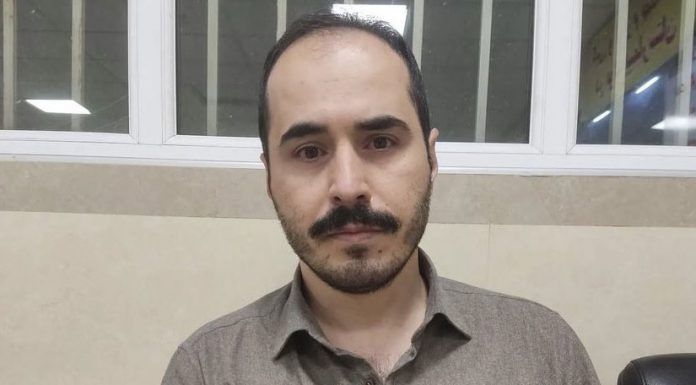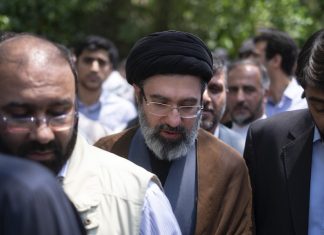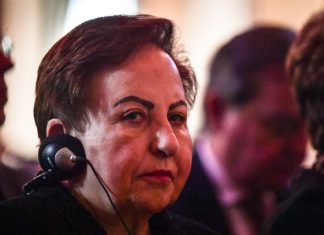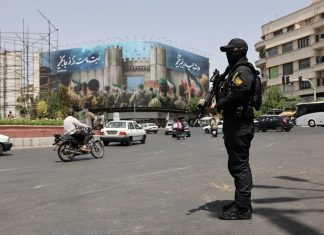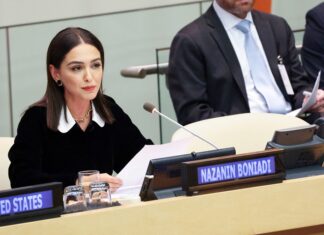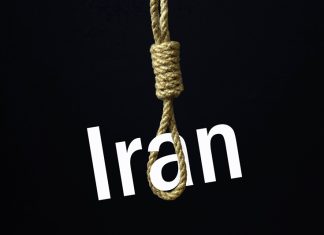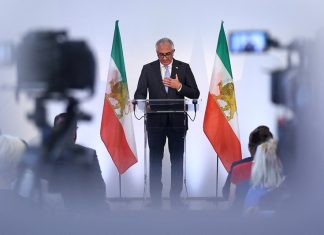Hossein Ronaghi, an influential civil rights activist and blogger, was released from prison on March 2 after posting bail, pending a trial.
Authorities arrested Mr. Ronaghi, whose full last name is Ronaghi-Maleki, on Feb. 23. His family did not know his whereabouts or condition for three days. The prosecutor’s office finally informed Ronaghi’s lawyers of his arrest.
“Hossein spoke to his mother on the phone at 11 am before leaving the house and going to work. No one knew what happened to him after that. Also, his mobile phone was switched off,” a source familiar with the situation told Kahan Life. “He had received several threatening phone calls recently from the Intelligence Ministry’s agents, using an unlisted number.”
“It is unclear who arrested Hossein and where he was taken,” the source added.
Hossein Ronaghi has been a prominent blogger for the past two decades, writing in Iran under his pen name, Babak Khorramdin. He is a software programmer, blog designer, and web filtering expert fighting cyberspace censorship in Iran.
On Dec. 13, 2009, authorities arrested Hossein Ronaghi and his brother Hassan at their father’s home in Malekan, in the northwestern province of East Azerbaijan. His brother’s arrest was aimed at forcing a confession from Hossein Ronaghi. After spending seven years in prison, Hossein Ronaghi was finally released in 2016, but only after posting $1,100 in bail.
During his incarceration, Ronaghi was tortured repeatedly and experienced a wide range of health issues, including digestive complications, kidney failure, respiratory problems, enlarged prostate, and blood thickening disorder. He currently needs emergency throat surgery to remove a tumor.
After his most recent arrest in February of this year, his brother Hassan tweeted that four days after being abducted by unknown persons, his brother had contacted the family saying that he had gone on “hunger strike, refusing to eat solid food” after his arrest.
UN Must Tackle Iran’s ‘Human Rights Crisis,’ Amnesty International Says
Shortly after Ronaghi’s conversation with his family, Majid Tavakoli, another civil rights activist who himself had previously been imprisoned, tweeted: “Hossein Ronaghi’s lawyer was refused entry into the prosecutor’s office in [Tehran] Evin [Prison] today. We know a complaint has been filed against [Ronaghi] at Branch 2 of the prosecutor’s office (Hajimoradi). Hossein has not been in touch. We are worried about him, given his history of poor health. A previous [court] ruling had exempted him from serving a prison sentence because of his medical conditions.”
Ronaghi’s arrest sparked global outrage, with many on social media calling for his immediate release. International news outlets — including Associated Press (AP), the BBC News, the Wall Street Journal, Arab News, New York Post, and the U.S.-based Committee to Protect Journalists (CPJ) — also released a statement calling on the Islamic Republic to drop all charges against Ronaghi and release him immediately.
A 10-minute video clip of Ronaghi and his mother sparked a global reaction.
“They ask why we are not scared and how is it we are not arrested,” Ronaghi said in the video. “We are not part of this corruption, and hence we are not frightened. We must rise above our fears and fight for our rights. There is no room for fear because these conditions will lead to a dark future.”
Iranian Opposition Groups Urge UK, France, Germany to Support the Iranian People
IRGC Officer Tells Tribunal of Khamenei’s Alleged Role in Suppressing 2019 Protests
At Iran Conference in DC, West Is Urged to Recognize Iranian Uprisings
In a tweet prior to his arrest, Ronaghi criticized the government’s bill on restricting and possibly blocking the internet. He argued that the bill’s sponsors were working at the behest of Iran’s Supreme Leader Ayatollah Ali Khamenei, who he identified as the true architect of the proposal.
In July 2021, the Majlis (Iranian Parliament) passed a draft bill on “Protecting Rights of Internet Users and Regulating Social Media Messaging Apps,” under which Iranian authorities could filter almost all popular messaging platforms.
“If you cannot write the truth about the ‘Protection Plan’ and internet censorship in Iran, do not bury the truth,” Ronaghi tweeted in English on Feb. 22. “The Protection Plan was a decision made by the entire system based on the demand from Islamic Republic’s leader who had stated: ‘Virtual space must be controlled.’”
In a recent interview with the German tabloid Bild, Ronaghi said he had been severely tortured while in Evin Prison, had lost a kidney, and continued to experience chronic pain.
“The good thing is that I am still alive and can continue my work,” he added. “The treatment was inhumane, and despite being sick, I received no medical care. They also arrested my brother and tortured him violently in front of me. I live with one kidney now. I have lost many things, but not my courage.”
“The virtual world doesn’t escape control. Facebook, Twitter, and other platforms have been banned,” Ronaghi said in an interview with Wall Street Journal on Oct. 12, 2021. “Social-media monitors scour the web to identify and arrest those who post content deemed to violate religious dignity or insult the regime’s leaders, and this was another of my ‘crimes.’”
“There have been five nationwide uprisings against the regime in our country in the past four years,” Ronaghi noted in the interview. “Our government has slaughtered protesters and tortured political prisoners to suppress them. Yet most people in the West — even those who consider themselves informed on Iran — don’t know our reality because foreign media coverage consistently overlooks or denies our reality.”
“This is our reality. Yet when we look abroad, we see its media portray another Iran. As protests raged across Iran in November 2019 and the Islamic Republic shut off the internet and dispatched military units to slaughter more than 1,500 protesters, a Bloomberg Iran correspondent tweeted about unexpected snowfall in Tehran,” Ronaghi explained. “When the regime shot down Ukraine International Airlines Flight 752 in January 2020, murdering 176, many Western media reports said our president did not know [of] the attack — but gave no evidence for the claim.”
In 2010, the year after Ronaghi’s arrest and incarceration, Kayhan London published a report on the specific charges against the blogger. Ronaghi was accused of “trying to undermine national security,” “affiliation with foreign organizations, and receiving money from them.”
He was ultimately convicted of “forming illegal groups as proxies to undermine national security,” “propaganda against the Islamic Republic,” “publishing misinformation to agitate public opinion,” and “insulting the leader of the Islamic Republic.” He was handed a 15-year prison sentence.
In July and August 2011, Ronaghi wrote two letters to Tehran prosecutor Abbas Jaffar Dowlatabadi requesting a medical furlough. After sending the second letter, he was allegedly beaten unconscious in prison on Aug. 15, 2011. He was taken to Tehran’s Taleghani Hospital but transferred back to Evin Prison after regaining consciousness a few hours later. The Islamic Revolutionary Guards Corps (IRGC) Intelligence Protection Organization rejected a plea to release Ronaghi in the summer of 2011 on medical grounds, causing him to lose a kidney.

